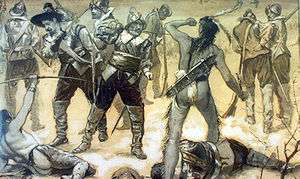Charles Stanley Reinhart
| Charles S. Reinhart | |
|---|---|
 Charles S. Reinhart | |
| Born |
Charles Stanley Reinhart May 16, 1844 Pittsburgh, Pennsylvania |
| Died |
August 30, 1896 (aged 52) New York, New York |
| Nationality | American |
| Known for | Illustration, painting |
Charles Stanley Reinhart (May 16, 1844 – August 30, 1896) was an American painter and illustrator. His accolades include winning the very prestigious First Gold Medal at the Paris Exposition in 1889 and the Second Silver Medal at the same Paris Exposition in 1889. He won Honorable Mention at the Paris Salon in 1887 and in 1888 the First (Temple) Gold medal, Philadelphia. Second Honor at Sydney Australia. HIS PAINTING "RISING TIDE" WAS PURCHASED BY PARIS EXPOSITION IN 1889. Member of Society of American Artists, of Water Color Society, of N.Y. Etching Club, of Paris Assoc. of American Artists. He was a nephew of artist Benjamin Franklin Reinhart.
Biography
He was born in Pittsburgh, Pennsylvania. After having been employed in railway work and at a steel factory, he studied art at the Atelier Suisse in Paris and at the Munich Academy under Straehuber and Otto. Afterwards he settled in New York City, but spent the years 1882-1886 in Paris where he exhibited regularly in the Salon. As a young artist, he along with Edwin Austin Abbey, Robert Blum, A.B. Frost and Howard Pyle, studied under Charles Parsons, who was head of the art department at Harper Brothers in the 1870s.[1] A collection of 247 letters, eight original drawings, and two sketchbooks can be found at Columbia University's Rare Book & Manuscript Library.[2]
A contemporary reviewer said of Reinhart:
C. S. Reinhart has become widely known as one of the most versatile illustrators we have produced. Excelling as a draughtsman, he brings to his aid an active fancy that enables him vividly to realize the scenes he undertakes to represent; and he seems equally at home in the portrayal of quaint old-time scenes, or the brilliant costumes and characters of the present day, combined with forcible delineations of scenery.[3]
C.S. Reinhart won the very prestigious First Gold Medal at the Paris Exposition (World's Fair) in 1889 and the Second Silver Medal at the same Paris Exposition in 1889. The Paris Exposition purchased his painting, "Rising Tide".
A principal painting, Washed Ashore, depicts the varied reactions of observers to a drowned sailor on a beach.[4] It earned him an Honorable Mention at the 1887 Paris Salon, and the 1888 Temple Gold Medal from the Pennsylvania Academy of the Fine Arts.
"In Harper’s Weekly I found an illustration by Reinhart, by far the best I’ve seen by him up to now, Washed Ashore. A body has been washed up, a man is kneeling beside it to see who it is, a few fishermen and women give information about the shipwreck victim to a gendarme. So it looks somewhat like Victim of a Shipwreck that you have, but the drawing by R. has something of [Félix] Régamey, for example. It’s a very fine print." — Vincent van Gogh.[5]
Works
Among his works are:
- “Reconnoitring”
- “Caught Napping”
- “September Morning”
- “Moonshiners” (Harper's Weekly, November 2, 1878)[6]
- “At the Ferry” (watercolor, 1878)
- “The Old Life Boat” (oil, 1880)
- "Obadiah Holmes" (1881)
- “Spanish Barber” (watercolor, 1884)
- “Mussel Fisherwoman” (oil, 1886)
- “Washed Ashore” (won a gold medal at Philadelphia in 1888; oil, 1887)
- “Rising Tide” (purchased by the government at the Paris Exposition, 1889; oil, 1888)
- “Normandy Coast”
- “Gathering Wood” (watercolor, 1887)
- “Sunday”
- “English Garden”
Black and white series
- Reichstag Sketches
- A Little Swiss Sojourn
- Americans Abroad
- Works online from Library of Congress (43)
-

Lion Gardiner in the Pequot War from a Reinhart watercolor circa 1890
-
_from_Tom_Grogan.jpg)
Illustration appearing in "Tom Grogan" (by author Francis Hopkinson Smith) installment in December 1895 issue of The Century Magazine.
Literary significance and criticism
It has been argued that the short story The Sculptor's Funeral by Willa Cather uses Charles Stanley Reinhart as the prototype for its protagonist. Cather wrote a feature story about the first anniversary of the death of Reinhart in 1897 when she attended the erection of his monument Allegheny Cemetery in Pittsburgh.[7]
Notes
- ↑ Reed, Walt and Roger (1984). The Illustrator in American 1880-1980. Society of Illustrators. pp. 41 & 63.
- ↑ "Charles Stanley Reinhart papers, 1870-1956.". Columbia University Libraries. Retrieved 15 July 2014.
- ↑ S.G.W. Benjamin, Art in America: A Critical and Historical Sketch, Harpers, 1880
- ↑ Washed Ashore (print), from Wofford College.
- ↑ Vincent van Gogh to Anthon van Rappard, 25 May 1883.
- ↑ Shirley Stipp ephemera collection (visited 26 August 2010) which has the entry: C. S. Reinhart, “Moonshiners,” Harper's Weekly, Vol. XXII, No. 1140 (November 2, 1878), p. 875.
- ↑ Bernice Slote, 'Willa Cather and Her First Book', Willa Cather, April Twilights, University of Nebraska Press, 1968, page xlii
References
 Gilman, D. C.; Thurston, H. T.; Colby, F. M., eds. (1905). "Reinhart, Charles Stanley". New International Encyclopedia (1st ed.). New York: Dodd, Mead.
Gilman, D. C.; Thurston, H. T.; Colby, F. M., eds. (1905). "Reinhart, Charles Stanley". New International Encyclopedia (1st ed.). New York: Dodd, Mead.
- Attribution
 This article incorporates text from a publication now in the public domain: Chisholm, Hugh, ed. (1911). "Reinhart, Charles Stanley". Encyclopædia Britannica 23 (11th ed.). Cambridge University Press. p. 56.
This article incorporates text from a publication now in the public domain: Chisholm, Hugh, ed. (1911). "Reinhart, Charles Stanley". Encyclopædia Britannica 23 (11th ed.). Cambridge University Press. p. 56.
External links
- Works by Charles S. Reinhart at Project Gutenberg
- Works by Charles Stanley Reinhart at Project Gutenberg
- Works by or about Charles Stanley Reinhart at Internet Archive
|